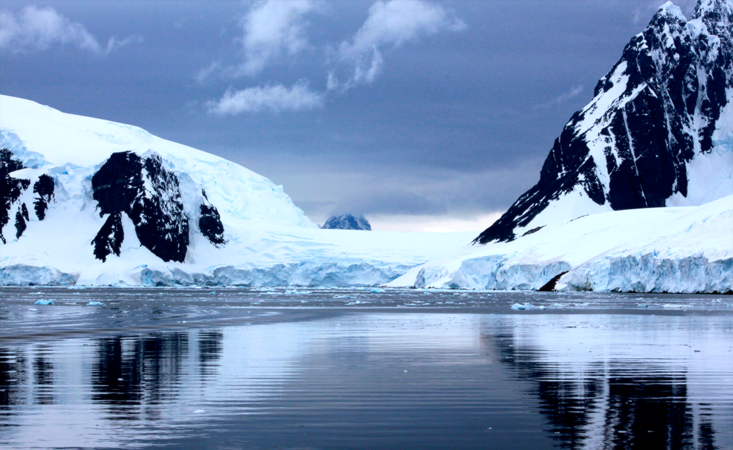Joe Pettit is a person of contradictions. A lover of solitude who manages teams, an engineer who writes poetry and paints, a family man who spends several months a year on remote Antarctic glaciers, installing delicate scientific instruments. It’s a rare mixture of qualities to find anywhere in the world—except, perhaps, in Antarctica.
Indeed, these days Pettit’s job involves finding other engineers like him, assembling the crack teams that place ice-penetrating radar and other equipment at both poles of the Earth. It’s challenging work, but vital.
Pettit’s teams provide support and equipment to researchers studying polar glaciers. Glaciers are constantly in motion, flowing outward under the pressure of accumulated snow that compresses into glacial ice. Some glaciers flow as fast as several kilometers a year. They are also melting. As our climate warms, the planet’s ice sheets are vanishing faster than anyone expected, pouring meltwater into rising seas. Understanding glaciers is critical to predicting some of the most severe climate disturbances we face. Researchers need to know how fast glaciers move over different kinds of terrain, where and how they are becoming unstable, and how quickly they may collapse. Pettit makes that possible.

For the past 30 years, Pettit has worked as an engineer and project manager. He first worked the busy summer season at McMurdo Station, the largest research base in Antarctica. Soon he began to work through the winter: eight months of nearly perpetual darkness, brutal cold, and fierce storms. He lived for months without sun, and fell in love with the polar night. He became McMurdo’s resident aurora chaser, reading up on the Southern Lights and alerting his colleagues when they could expect the most dazzling displays. He found different jobs to make sure he had work each winter: engineer, research associate, head of glacier search and rescue.
What does it take to survive—and love—a place like Antarctica? As many of us around the world prepare for our own long, socially distanced winters, Pettit has some wisdom to share. He offers it below in his own words.
Feel at home
I first went down to Antarctica in 1990. It came out of a job search. I was living in Colorado Springs and looking through want ads in the newspaper. I happened upon one for a company called Antarctic Support Associates. They were looking for an engineer and my background is in electrical engineering. The day I got there just happened to be my 30th birthday. It was a white-out. Super windy. As we came off the plane, people would grab our hand and put it on the shoulder of the person in front of us and say, “Just hang onto this guy and follow them over to the vehicle.” I thought “Yeah, this is it!” The next day the clouds lifted, and there’s the Royal Society Mountain Range, stretching about 60 miles out. It was stunning. I couldn’t believe it. I went down there not knowing what it was going to be like, because it didn’t fit in the framework of any of my previous experiences. I loved that part of it, I loved where I was, I loved the science and the work I was doing.
If you expect it to be amazing and filled with new experiences, you end up looking for those experiences.
Follow the stars
To spend an entire year is the only way to experience Antarctica. It changes every day—the light, the people, their moods, the pace of life. From the summer to the winter, things slow down. It’s amazing to use the stars spinning overhead during the winter as a sundial, where by the position of stars you know what time of day or night it is. It’s been 30 years for me now, which is hard to imagine. But every year there will be something that happens, or something I see, and I’ll be like, “Yeah, this is why I keep coming back, this is where the magic is.” For me it’s just the majestic nature of the place, the fact it’s so remote, so austere, and yet so incredibly beautiful. The sense of the scale of Antarctica is what really touches me.
Have no expectations
You have to know what your expectations are. If you expect it to be hard, it’s going to be hard. If you expect it to be amazing and filled with new and interesting experiences, you end up looking for those experiences. People who are resourceful and come up with ways of managing changing conditions personally or professionally do better over the long haul. One thing that happens to the best of us is putting a departure date on the calendar. Inevitably you don’t make it out that day because the air strip needs to be adjusted or the plane can’t fly because the weather makes it impossible for the pilot to see anything. A lot of people really suffer with that. They lose it. But people who can make plans A, B, C, and D and not be bothered by the fact that the first three plans just went out the window do well. The flexible are the ones who do best in Antarctica.

Love to be alone
People who enjoy people, but at the same time are comfortable being alone, do best. There’s solitude and seclusion, and how you feel about that makes a difference. If you’re an introvert, you can manage well, though a lot of things, like meals, take place in a large-group setting. So if you’re an introvert you may feel awash in a sea of faces. People who are curious do well because everybody’s asking questions about the place and wondering about Antarctica. Being curious about the science, about each other, makes a difference. People comfortable being far away from home will stay there longer than people who aren’t.
It’s helpful to have hobbies. I fall on the artist side of things, so on my down time I do painting and drawing, photography, and music. People who like to be outdoors and hike or ski do really well. I’ve met people who stay in town or indoors as much as they can, and they tend to get more dour as time goes on. So being able to get out and actually immerse yourself in the experience of the place is really important. I wintered with a woman once who was a hair stylist. She was going to stay in Building 155, where the dining facility is, and most of the administration and recreation departments, her entire winter. She thought, “That’s going to be my challenge.” And I thought, “What a loss!” She never saw an aurora, she never saw some of the beautiful things that happen during the winter. She met her challenge but it was to the detriment of completely missing the experience of Antarctica.
If you’ve got a bunch of pessimists together, then nothing is going to happen other than misery.
Be optimistic
If you surround yourself with people who are optimistic, then you’ve got a really good team. If you’ve got a bunch of pessimists together, then nothing is going to happen other than misery. That’s a fact of life anywhere, but when you’re really on the margins, and things can go either way depending on which decision you make, coming at problems optimistically broadens the horizon of possible ideas you can come up with—as opposed to, “Oh, it’s just not going to work.” We work on equipment and instruments as if they’re going to be on the moon. There are no hardware stores. Once an instrument is out there, especially in the deep field, you can’t get back to it for a year or two. So you design and build and test things with the expectation that they have to work. You try to stack the deck in your favor in every way you can possibly imagine.
Appreciate luck
Once, we had a massive storm in June, which is midwinter. It was during an airdrop. Air Force planes would drop pallets full of food and mail out of the back of the plane, with parachutes, onto a designated drop zone. To get ready for the drop, you have to bring power to the zone, which in this case was a snowy runway. A crew would go out there and have runway lights on two sides of the drop zone. This storm was particularly horrendous. The crew driving out there should have stopped, but they kept going and it got worse. They couldn’t see the bamboo poles marking the road, and wandered off into the darkness. We had to go find them. The wind speed was so high it was roaring like a freight train. You had to get up to someone’s ear and yell at them to get any information past that roar. Suddenly, the wind went from 100 sustained knots to virtually zero. It just stopped all at once, and there was this fine haze of snow coming down. We called the lost supply van and asked, “You guys have a flashlight?” We told them to get up on top of the van and start spinning around in a circle. Sure enough, somebody spotted a light and we got a compass bearing on them. It was a lucky break. Sometimes you just have to rely on that luck and say, “You know, that’s good enough.”
Marissa Grunes is a postdoctoral fellow at the Harvard University Center for the Environment, where she is at work on a book about Antarctica.
Lead image: U.S. research outpost, Palmer Station, located on Anvers Island in Antarctica, where Joe Pettit has been manager of operations. Photo by Marie Zahn.






























